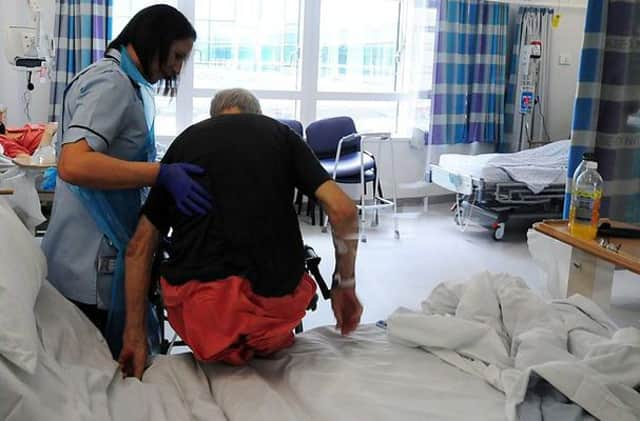Lancashire is the worst in the North West for '˜bed-blocking' rise


In 2015 in Lancashire, there were 42,543 days lost because patients who were ready to be discharged were kept in hospital due to delays in providing alternative care.
This was an increase of 15,769 days lost compared to 26,774 in 2011, meaning Lancashire was worst for increases in the North West.
Advertisement
Hide AdAdvertisement
Hide AdA delayed day is counted for each day a patient has been delayed leaving hospital after they were medically fit to.


The GMB Union, which compiled the figures from NHS reports, said there were a variety of reasons for delaying the discharge of patients.
These include sorting out a place in a care home, delays in arranging further NHS care, sorting out care at a patient’s home, interagency delays, and delays due to patient or family choice about future care.
Paul McCarthy, GMB Regional Secretary said “bed-blocking” was worsening due to Government austerity measures.
Advertisement
Hide AdAdvertisement
Hide AdHe said: “The severe cuts in local authorities’ social services provision is the major contributory factor for bed-blocking getting worse.


“For England as a whole bed-blocking has increased from 1.4 million days in 2011 to over 1.7 million days last year. Councils have had to shunt the problem to the NHS. Councils have not been able to accept the patients from the NHS because they have been starved of funds.”
Karen Partington, chief executive at Lancashire Teaching Hospitals NHS, which runs the Royal Preston Hospital and Chorley and South Ribble Hospital, said: “Our priority is the wellbeing of our patients and we will not discharge patients who need further care in the community, until that care has been arranged, even if the patient no longer needs acute hospital care.
“However our hospitals are busier than ever and we are seeing continual increases in the number of patients visiting our Emergency Departments that need to be admitted.
Advertisement
Hide AdAdvertisement
Hide Ad“In hospital every day there are at least 40 people, often many more, who no longer require our specialist care, but who cannot be discharged because arrangements aren’t in place to meet their ongoing health and social care needs.


“This sometimes means we have no option but to postpone planned procedures to make sure we have enough capacity and resources to look after the increasing number of patients with serious conditions who need urgent care.
“We are working closely with our local health and social care organisations to try to alleviate the pressure on our hospitals, and ensure that additional services will be provided to support people in the community.
“We hope patients and their families can see that all of our staff are absolutely committed to making sure anyone who requires urgent treatment is admitted to hospital promptly, and are doing all we can to continue to provide the highest standard of care.”
Advertisement
Hide AdAdvertisement
Hide AdCounty Councillor Tony Martin, cabinet member for adult and community services, said: “We recognise the importance of ensuring that patients are discharged from hospital promptly, into appropriate care, and our hospital-based social workers provide a vital seven day a week assessment service to support this .


“However, assessment of an individual’s care needs is just one part of a complex and interdependent system, which also includes health services and the availability of residential care and care in people’s homes.
“The system as a whole is under pressure at the moment and any solution will have to look at the system in its entirety, rather than individual elements in isolation.”